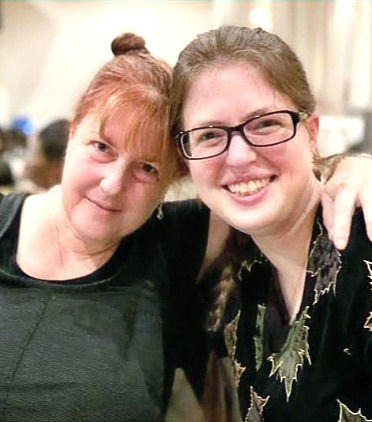(by Sara Kass Eifler)

My mom is a big fan of gadgets. If there’s some technology out there that can do the messy, complicated, or just plain tedious tasks for her, you can guarantee that she’s going to open up her wallet. (On her iPhone.)
My mom believes in hard work, but not stupid work. We had a machine that shuffled cards for us as a ‘90s household that never played cards. We had a GPS before GPS was a thing, when most people were still trying to refold those paper maps in their cars. And then there are the kitchen gadgets: popcorn popper, cotton candy machine, ice shaver, two different ice cream makers, coffee grinder, electric can opener, digital thermometer, lemon press, apple corer, cherry pitter, pasta machine, fondue pot, air fryer, very fancy blender, jam-making array, and of course all the pots, pans, trays, and tins.
But my favorite is the bread machine.
My parents divorced when I was three, and my mom married my stepdad a few years later. The son of a Holocaust survivor, he brought a more intentional Judaism into our lives, along with my stepsister and, soon, my half-sister. Every other Friday night, on my mom’s weekends, we would gather in the dining room for Shabbat, and a beautiful golden challah would preen beneath its cover.
When I went vegan at 14, that challah, made with eggs, was no longer appetizing to me. I’d learned too much about the cruelty of the animal agriculture industry, and I couldn’t bear to have it represented on my plate. My oneg Shabbat (literally “delight of the sabbath”) had to understand and incorporate my active longing for a world in which nonhuman animals were treated with compassion, care, and respect.
My mother got out her bread machine.
You have to understand: This was 2004, well before the age of the Impossible burger and Just Egg. No one else in my family was vegan; in fact, I didn’t know any other vegans at all. I was ostracized and bullied at school for being a “radical,” including by my teachers. And beyond all of that, we were a family of seven people, with five kids ranging in age from 16 to 6. My mother already had a whole spectrum of tastes and tolerances to contend with, and she had no reason to think my veganism was anything other than a nuisance.
But my mom understood commitment, even if she didn’t always understand me. She knew that I meant it and that it mattered to me. She knew me, and she loved me, and, well, she’s a Jewish mom. How else do you love someone than to feed them?
So every Friday, out would come the bread machine, and my mother would get busy. Two bowls of dough; two baking pans sprayed with Pam; two hours each stirring and rising and kneading and baking. Two loaves of challah preening beneath their cover: one gleaming golden, one a little paler, but both warm and fragrant and emanating such, such love.
The machine did the kneading for her, but my mother worked so hard to meet my needs. And she still does. Every Shabbat that I’m there with her; every time we light the candles and say the kiddush; every time we bless our time and our space and our love together: there’s a vegan challah on the table, waiting just for me.
---
Sara Kass Eifler (she/they) is a writer, rabbinic student, and director of programming at Jewish Veg, an organization that encourages plant-based lifestyles through celebrations and conversations about Jewish values. She lives on Cape Cod, Massachusetts with their partner and companion cat. Her work is published in or forthcoming from journals such as Hyacinth Review, Corvid Queen, and Green House Literary.

Mom’s Vegan Challah
3/4 c. almond or soy milk
2 T. vegan butter (we usually use Earth Balance)
2 vegan egg equivalent (like Just Egg, or 1 T. flaxseed meal in 2 – 3 T. water),
plus additional for brushing on the bread
1/4 c. sugar
3 c. flour (we use bread flour)
1 1/2 t. rapid or quick yeast or bread machine yeast
Place all ingredients up until flour in the bread machine in the order written.
Add flour, make a small well in the middle, and add yeast.
Run machine on Dough cycle.
Remove dough and divide into 3 equal pieces.
On a lightly floured work surface, roll each piece into a long, slender rope.
Braid the 3 ropes together on a lightly greased baking sheet.
Cover and let rise in a warm, draft-free place for 1 - 1 1/2 hours.
Preheat oven to 350 F.
Use egg equivalent mixed with some water to create a wash. and brush on top of challah. Bake about 25 minutes or until golden brown.


コメント